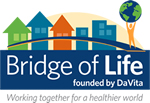High blood pressure — or hypertension — is the number two cause of kidney failure in the U.S. Each year, about 27% of all kidney failure is caused by high blood pressure.1 Even if you can’t feel it, having high blood pressure can harm your kidneys. It also raises your risk of stroke, blindness and heart attack. Each beat of your heart forces blood through your blood vessels. When blood pressure is normal or low, this force is harmless. But when it’s high, the vessels become thicker — and less flexible. No one is quite sure how the damage occurs. One theory is that the thicker vessels bring less blood flow to the kidneys.2 People who are over age 55, African American or have a family member with high blood pressure are more likely to have high blood pressure. The only way to know for sure if your blood pressure is high is to have it checked. Your blood pressure should be less than 140/90. If you also have diabetes, it should be less than 130/80.3
What You Can Do
High blood pressure is something you can do a lot about, through diet, exercise, and medication. With good control, you can protect your kidneys. Here’s how:
- Check your own blood pressure. You will find that it varies with the time of day and amount of stress you are under. For about $25-$75, you can buy an accurate blood pressure monitor to use at home. Ask your nurse to suggest a model and show you how to use it.
- Keep track of your blood pressure in a notebook. Bring the notebook along for your doctor visits.
- Lose weight if you’re heavy. Weight loss helps bring high blood pressure down. Your doctor can refer you to a dietitian who can give you tips.
- Eat more fruits and vegetables. The DASH (dietary approaches to stop hypertension) eating plan is proven to reduce high blood pressure — and it tastes great!
- Limit salt in your diet. Some people are very sensitive to salt, and it will raise their blood pressure. Since it’s hard to know who does and doesn’t have this problem, it’s wise for all of us to eat less salt. Canned or dried soups, processed meats (e.g., bacon, salami, Slim Jims®), “Helper® ” foods, and anything pickled tends to be very high in salt — look for “sodium” on the label. Avoid salt substitutes, though — if your kidneys are damaged, these can harm you.
- Get moving! Talk to your doctor about doing moderate activity for about half an hour most days of the week. It doesn’t have to be formal “exercise” — mowing the lawn, dancing, gardening, even vacuuming count. You want to be up and moving around. Staying active helps keep your blood vessels flexible and makes your heart stronger.
- Practice meditation. Calming your mind can lower your blood pressure. Try taking 15 minutes each day to sit quietly in a comfortable chair with your eyes closed. Play soft music. Breathe in and out slowly and pay close attention to each breath. It’s that easy.
- Take your blood pressure pills just as they are prescribed. Some people think they can feel when their blood pressure is high, and then they take a pill. But blood pressure drugs need to be in your system all the time to work. After all, you never know when something will stress you. If the drugs make you dizzy, cause erectile problems, or cost too much, talk to your doctor. There are many blood pressure pills out there, and another one might work better for you.
- Check for sleep apnea. If your partner tells you that you snore loudly and stop breathing during the night — then restart with a snort, you may have sleep apnea. This is a condition where you are not getting enough air in your lungs when you sleep. It can cause hard-to-treat high blood pressure and other health problems, but can be treated.4 Talk to your doctor about getting a sleep study.
Questions to Ask Your Doctor if You Have High Blood Pressure
- What blood pressure monitor do you recommend for me to use at home?
- How often should I check my blood pressure?
- What level of blood pressure do you see as a good target for me?
- Can you refer me to a dietitian, and will my insurance plan cover it?
- Is it safe for me to do moderate activity?
Links to Learn More
- American Heart Association – Take the High Blood Pressure Quiz and test your knowledge: http://www.americanheart.org/presenter.jhtml?identifier=3021399.
- American Heart Association – Learn about types of blood pressure medication from the American Heart Association:http://americanheart.org/presenter.jhtml?identifier=159.
- American Heart Association – Learn about how cold and flu medications and other over-the-counter drugs can affect people with high blood pressure: http://www.americanheart.org/presenter.jhtml?identifier=580.
- Consumer Reports – Consumer Reports about ACE Inhibitors and which ones are good buys: http://www.crbestbuydrugs.org/drugreport_DR_ACEI.html.
- Kidney School – Free online Heart Health and Blood Pressure Module learning tool: http://www.kidneyschool.org/mod_13/mod13_01.shtml or download it and read it at your convenience: http://www.kidneyschool.org/pdfs/KS-Module_13.pdf.
- National Heart, Lung, and Blood Institute – Free booklet on lowering blood pressure with recipes, tips, and more: http://www.nhlbi.nih.gov/health/public/heart/hbp/hbp_low/hbp_low.pdf or order a single copy mailed to you: http://emall.nhlbihin.net/product2.asp?source=&sku=5232.
- National Heart, Lung, and Blood Institute – Read about the DASH Diet which explains how to eat right to lower your blood pressure: http://www.nhlbi.nih.gov/health/public/heart/hbp/dash/new_dash.pdf.
- National Heart, Lung, and Blood Institute –Read about sleep apnea to learn more about this condition and how it is treated: http://www.nhlbi.nih.gov/health/dci/Diseases/SleepApnea/SleepApnea_WhatIs.html.

